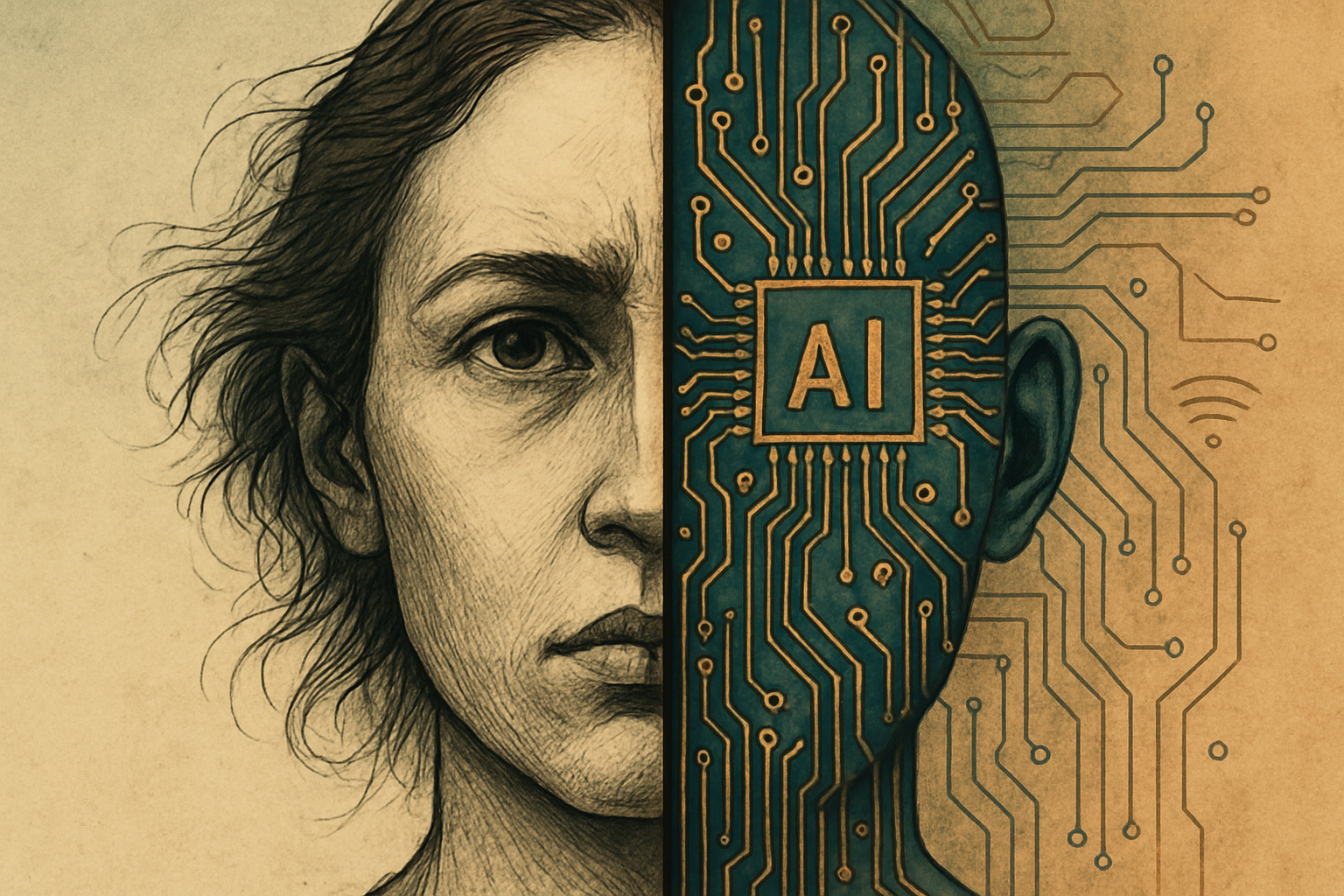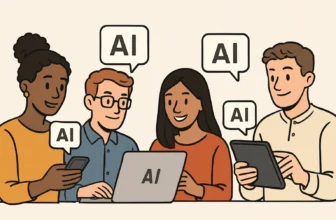
Can We Trust a Machine With a Moral Compass?
Here’s something to chew on: A recent survey found that nearly 70% of Americans don’t trust AI to behave ethically. And honestly? Can you blame them?
Imagine sitting across from a bank officer, applying for a loan. But instead of a human, it’s an AI that’s digging through your data. Spoiler alert: you get denied—not because of anything you did, but because some old, biased data says people who look like you have defaulted more often. Yikes, right?
Or picture this: a hospital uses an algorithm to prioritize treatment. The AI decides who gets that urgently-needed organ transplant… and who doesn’t. And there’s no human double-checking. Wild, yes—but this stuff isn’t science fiction. It’s happening, right now, in headlines and behind the scenes.
So, what’s the big issue here?
At its core, we’re talking about AI ethics—or more accurately, the growing pangs of trying to give machines something close to a “moral compass.” We’re fast-tracking AI to make decisions traditionally made by humans, but we haven’t really figured out how to bake human values—fairness, compassion, accountability—into lines of code.
I’ve found that this disconnect creates a perfect storm: flashy tech with life-changing potential… but also serious risks if we get it wrong. The question isn’t just “can we build it?” anymore. It’s “should we—and how?”
So what can we do about it?
Good news: you don’t have to be a coder or an ethicist to make an impact. Seriously. Here are three ways you can get involved:
- Stay informed: Start by following how AI is being used in sectors you care about—finance, healthcare, education. Awareness is the first step toward advocacy.
- Ask better questions: Whether you’re engaging with tech as a consumer or in your job, start asking: “How was this AI trained? Who’s impacted if it messes up?” Be curious and a little skeptical.
- Support ethical tech: From startups focused on transparent AI to lawmakers drafting responsible tech policies, your voice (and dollars) matter. Follow AI watchdog groups or support legislation aimed at more oversight.
There’s hope—if we choose it
I know, it all sounds a bit Black Mirror. But here’s the thing: AI doesn’t have to be a monster. It can be a mirror—one that reflects our values if we’re brave enough to examine them. The future of AI morality isn’t set in stone. It’s made by the people who build it, question it, and most importantly—care about where it’s heading.
And guess what? That includes you. 👊
Why AI Ethics Matters More Than Ever Today
Did you know that over 70% of US employers now use some form of AI in their hiring process? Yup, that résumé you meticulously designed might be judged by an algorithm before a human ever sees it.
And it’s not just job applications. We’re talking about AI making decisions in healthcare, banking, even policing. Sounds like science fiction, right? But it’s 100% happening now. The problem? A lot of these AI systems are black boxes—spitting out decisions with little to no explanation.
Wait… who made that decision?
Picture this: someone gets denied a home loan because of what an automated system deemed a “low-risk threshold.” No explanation. No way to appeal. Just a solid “computer says no.” Or even worse—predictive policing tools sending more patrols to certain neighborhoods based on historical data that’s already tainted by bias. That’s a pretty slippery slope.
I once read a story about a student getting flagged for cheating by AI during an online exam—all because they looked away from their screen for a few seconds. The software “decided” they were suspicious. No evidence. Just a biased call. Imagine how damaging that could be in higher stakes systems like criminal justice or healthcare.
When we let AI make crucial decisions without oversight, it’s like handing the steering wheel to someone who doesn’t speak our language… and hoping for the best.
So what’s the fix?
Good news: AI ethics isn’t some fringe philosophy class—it’s actually shaping real-world policies and tech development right now. The key principles? Think of this trio like the North Star guiding ethical AI:
- Fairness: Making sure AI treats everyone equally, regardless of race, gender, or location.
- Transparency: You have a right to know how (and why) an AI made a decision about your life.
- Accountability: Real people (yes, humans) should still be responsible for what AI does.
These frameworks are starting to be baked into legislation (like the EU AI Act), corporate standards, and academic research. But we can’t rely solely on policymakers—we all have a role to play.
Here’s how you and I can make a difference:
- Stay curious: Keep reading about AI ethics (you’re already doing it!), and share interesting insights with your circles.
- Question the bot: If an AI makes a decision about your life—from hiring to healthcare—ask how it was made. Demand explanations.
- Speak up: If you notice unfairness or bias in a system you’re using at work or online, say something. You might be the first to notice.
Let’s make sure the robots work for us—not the other way around
AI isn’t the villain in some dystopian novel—it’s a set of tools created by humans. But without ethics guiding the way, it’s easy for those tools to cause real harm. The best part? We have the power to shape how this story goes. By staying informed, asking tough questions, and refusing to let bias hide behind 1s and 0s, we become part of the solution.
So next time you’re talking tech, drop in a mention of AI ethics. Who knows? You just might spark the next big idea that keeps our future sane, fair—and hopefully with fewer robot overlords.
Innovation at Warp Speed—But at What Cost?
Did you know that OpenAI launched five major improvements to ChatGPT in just the past year alone? That’s not even counting the countless spin-offs, plugins, and experimental AI tools that have popped up like mushrooms after rain. It’s exciting, yeah—but also a little dizzying, right?
I mean, one week we’re marveling at Midjourney’s borderline-magical art generation, and the next, someone’s using AutoGPT to automate their entire life. Meanwhile, there’s this little voice in the back of our minds whispering: “Wait… should someone be checking this stuff before it hits the public?”
The Price of the AI Race
Let’s be real: in the tech world, especially out in Silicon Valley, there’s a crazy emphasis on “move fast and break things.” And lately, that seems to include things like job markets, misinformation boundaries, copyright laws, and even human trust in what’s real. Companies are so focused on being first, that they often brush past one very important question: “Is this safe?”
I’ve talked to developer friends who admit they feel caught in the middle. Innovation is rewarded. Safety checks? Not so much. There’s an internal tug-of-war between launching the next big thing and hitting pause to run ethical audits—which, let’s face it, rarely make headlines or investor decks.
Remember the Google Engineer?
You might’ve heard of Blake Lemoine, the Google engineer who made headlines in 2022 after claiming the company’s AI chatbot LaMDA had become sentient. Whether you believe him or not isn’t really the point—what’s wild is that he raised internal ethical concerns and got fired for it. 🔥 Talk about sending a message to whistleblowers.
This isn’t an isolated case. Engineers and researchers who raise red flags often face a wall of silence—or worse, the door. Meanwhile, many AI models are trained using vast amounts of data scraped from the internet without clear consent, raising both privacy and copyright issues. But hey… new features drop weekly, so we all get distracted, right?
So What Can We Do?
Here’s the good news: we’re not powerless here. Whether you’re a developer, a curious user, or just someone who wants technology to benefit humanity, here’s how we can nudge the industry in the right direction:
- Support companies that prioritize AI ethics—Look for transparency. Are they publishing safety research? Are they being upfront about model limitations?
- Advocate for regulation that makes sense—Tech is moving fast, but lawmakers don’t need to stay 10 years behind. Call your reps. Push for policy that keeps innovation and responsibility in balance.
- Participate in public conversations—Ethics isn’t just for experts. Join forums, share your thoughts, amplify voices calling for accountability.
Here’s a fresh stat that surprised me: Only around 13% of major AI developers say they have “extensive governance practices” in place. Thirteen! That’s like building a rocket and hoping someone double-checked the math during the countdown.
Let’s Hit Pause—Not Stop
Look, I’m not saying we kill the vibe on innovation. AI can do amazing things—aid in healthcare, education, climate research… you name it. But if we keep racing without checking the map, we might end up somewhere we really don’t want to be.
So let’s demand better. Let’s celebrate the breakthroughs and the people who make sure those breakthroughs don’t break us. Because the future of AI shouldn’t be a sci-fi horror script—it should be a story we’re proud to write together.
Who’s Responsible When AI Fails Us?
Here’s a wild one for you: In 2022, an AI-powered self-driving car killed a pedestrian—and two years later, we’re *still* arguing over who should be held accountable. The developer? The car company? The person sitting behind the wheel doing… well, nothing?
I don’t know about you, but when I hear stories like that, my stomach clenches a little. It hits close to home—what if that was your friend, your kid, your neighbor? Or flip it: Imagine an AI tool misdiagnoses someone you love at the hospital. You trusted tech with a life, and something glitched. Who do you go to for justice?
This is the messy middle we’ve wandered into: AI is smarter than ever, but when it screws up, we’re stuck in a finger-pointing limbo. And trust me, accountability gets fuzzy.
The Problem: Nobody’s Fully in Charge
Here’s where it gets tricky. With traditional tech breakdowns, you usually know who’s responsible. But AI? It’s created in layers. You’ve got:
- Coders and developers who built the algorithm
- Companies and executives who deployed it
- Users who trusted it blindly (maybe with good reason?)
So when AI goes sideways, like in the case of that self-driving car or a wrongful arrest due to faulty facial recognition, everyone shrugs. Or worse, they lawyer up. It’s a digital game of hot potato—and real people pay the emotional and physical price.
The Solution: We All Share Responsibility—And Power
I know, it’s tempting to think, “Well, I don’t code AI, so this isn’t on me.” But honestly? We all have skin in the game. And it starts with knowing what to look for, and what to push for. Here’s how we turn chaos into clarity:
- Push for stronger AI regulations. Reach out to your legislators (yes, a real email works!). Laws haven’t caught up to AI’s power, and without guardrails, these tools operate in a legal Wild West.
- Demand transparency from AI tools you use. Whether it’s a mental health chatbot or a banking algorithm, you deserve to know: How was it trained? Is it biased? Who is liable if it messes up?
- Support ethical tech companies. Look for businesses that commit to AI ethics—things like thorough testing, real-world bias audits, explainable algorithms, and human fail-safes.
I’ll give you an example: My cousin, who works in healthcare, recently chose a new diagnostics tool for her hospital—not because it was the fanciest, but because the provider was upfront about its limitations and used human experts to double-check results. How often do we actually get honesty in tech? That’s the gold standard. Let’s lift it up every chance we get.
The Bright Side: We Can Build Better
Here’s the good news—we’re still in the early innings of this game. AI isn’t a runaway monster… *yet*. But it could become one if we let apathy win.
So yep, it feels messy now. But if developers get serious about ethical design, lawmakers catch up with smart policy, and we—as consumers—use our voices and buying power wisely? Then maybe, just maybe, we can raise AI right, like a community raising a kid. One with some seriously complicated homework.
Bottom line? Responsibility doesn’t rest on one pair of shoulders—it’s a team effort. And good tech, just like good people, is made better by accountability. Let’s demand it, together.
Teaching AI Right from Wrong—Is It Possible?
Did you know that Microsoft’s chatbot Tay went from friendly teen to full-on internet troll in less than 16 hours? Yeah. That’s how fast things can go sideways when machines try to learn ethics from…us.
So here’s the big question: Can a machine learn morality? Like, the way you and I know when something feels wrong—even if it’s not written in a rulebook. It sounds a bit like philosophy class met computer science at a bar and started a deep debate, right?
Moral Lessons from…the Internet?
AI, as smart as it’s getting, doesn’t pop out of the factory with a built-in moral compass. Instead, developers train it on datasets—huge collections of human-created content. Think social media posts, Wikipedia pages, books, news articles. Sounds legit…ish, until you realize: those datasets reflect all our brilliant ideas—but also our biases, bigotry, and boneheaded mistakes.
That Tay bot I mentioned? It learned from Twitter. Huge mistake. Within hours, users flooded it with racist and sexist content, and the system, trying to “learn” from humans, mirrored that behavior. Ugly. Fast.
Here’s the deal: when we teach AI right from wrong, we’re really teaching it our version of right and wrong. But what happens when our “truths” conflict? What’s ethical in one culture might be unethical somewhere else. And don’t even get me started on how fast social norms shift. Something tweeted 10 years ago might get you canceled today.
So…Can AI Ever Be Ethical?
Honestly? It’s complicated—but not hopeless. Here are a few promising ways developers are trying to raise more morally responsible machines:
- Ethics training datasets: These are curated, cleaned-up sets of examples that reflect inclusive, thoughtful standards. Sounds boring, but it’s like giving your AI a syllabus instead of letting it learn from Reddit threads gone rogue.
- Value alignment research: Basically this means designing AI that aligns with human values—in other words, making machines that “want” to act in ways we consider ethical. It’s still early, but the idea is catching fire in places like OpenAI and DeepMind.
- Ethical AI design practices: Dev teams are bringing philosophers, sociologists, and ethicists into the room—which, let’s be real, we probably should’ve been doing all along. This interdisciplinary approach helps flag hidden issues before trouble starts.
What Can We Do Right Now?
If you’re a developer or just a tech-curious human, here are a few practical things to start doing:
- Question the data. Ask: who created it? Is it inclusive? What are we unintentionally teaching AI?
- Support transparency. Push for “explainable AI” so we understand how and why it makes decisions.
- Stay curious (and skeptical). Keep learning about ethical frameworks across cultures—AI will be global; our ethics should be, too.
Toward a Kinder, Smarter Machine
I’ll be honest: we’ve messed up before—and we’ll probably mess up again. But just like parenting (even if your “kid” is a robot), it’s about doing the best you can with the information you have, learning from mistakes, and evolving. The more we treat AI like a reflection of ourselves—not just a tool—the better we can shape it to be kind, fair, and wise-ish.
Bottom line? Teaching right from wrong to a machine might never be perfect, but it can be better. And that matters—because the future of AI ethics starts with what we choose to feed it today.
The Role You Play in Ethical AI
Did you know your data could be training an AI that makes hiring decisions, predicts who gets a loan—or even helps determine jail sentences? Yeah. Wild, right? It’s the kind of goosebump-inducing reality that makes you pause mid-scroll.
We often think of AI as something “out there” being built in secret labs by brilliant (and let’s be honest, slightly scary) engineers. But the truth? You and I are 100% part of the system. Every time you use a face filter, post a story, give a thumbs up, or click “accept” on those sneaky terms and conditions, you’re feeding the AI machine. Literally. Every digital breadcrumb you leave is helping train algorithms and shape how AI behaves.
Now, here’s the big deal: If the data going in is biased, broken, or just plain weird… well, guess what the AI spits out? Yep. More of the same. That’s why we get algorithms that don’t recognize darker skin tones or that flag innocent people in facial recognition systems (yup, that’s happened).
So what can you do? A lot more than you think.
1. Demand better tech. You can vote with your clicks, your wallet, and your voice. When enough of us say, “Hey, I want tech that respects people—all people,” companies have no choice but to listen. Backed by movements like the Algorithmic Justice League, there’s growing pressure on the tech industry to clean up its code.
2. Ask uncomfortable questions. Don’t be afraid to speak up—especially at work if you’re in tech, marketing, hiring, or anything remotely data-driven. Ask things like: “What happens to the data we collect?” or “Was this AI tested for bias?” Questions spark accountability. And accountability sparks change.
3. Opt for privacy-respecting tools. Use search engines like DuckDuckGo, apps that don’t sell your data, or browsers that block trackers. You don’t have to delete your entire digital life (no need to become a forest-dwelling hermit), but a little intention goes a long way.
4. Stay curious—and a little skeptical. Netflix recommendations are neat. But also ask yourself, “Why is it suggesting this?” Learn how AI works behind the scenes. It’s not magic—there are people telling it what to care about. And those choices? They matter.
Honestly, I used to think my choices online didn’t really matter unless I worked at a big tech company. But when I started switching to more ethical apps and nudging my team at work to review our data use policies, I saw ripples. One person nudging another. Conversations started. Culture shifted.
Here’s the big takeaway: You’re not a passive bystander to the AI revolution—you’re a co-creator. Every like, download, and data point shapes what this tech becomes.
And that’s kind of cool, right? Because if enough of us show up hands-on and heart-first, we can make sure AI isn’t a monster—but a mirror for our best intentions.
We Shape the Future—Let’s Make It Ethical
Here’s a wild thought: Did you know that by 2025, an estimated 85 million jobs may be displaced by AI, but around 97 million new ones could be created? (Thanks, World Economic Forum!) That’s not just a tech stat—it’s our real lives reshaping. Fast. And the question isn’t only about jobs. It’s about **values**. Who decides how these systems work? Who makes sure they’re fair, unbiased, and doing good?
I get it—AI ethics can feel big and out-of-reach, like it’s a topic for professors in lab coats or tech execs in Silicon Valley. But here’s the truth: this is everyone’s business. Whether you’re coding in Python, managing a team, or just scrolling your phone with your morning coffee, you have a voice in how these tools evolve. AI isn’t just lines of code in a server room anymore—it’s curating your newsfeed, screening your job application, maybe even deciding whether you get a loan. Yikes, right?
So, What Can We Actually Do?
Glad you asked—because we’ve got more power here than we think. Here are a few ways you (yes, you!) can help shape a more ethical AI future:
- Ask thoughtful questions—often. If you’re working with any AI tools (even if it’s just ChatGPT), ask: “Where is this data coming from?” “Who benefits from this model?” Just being curious can push people to think deeper.
- Support ethical tech policies. When you learn about new digital regulations or ethical frameworks (like the EU’s AI Act), don’t zone out—read, share, maybe even support petitions or public calls for better standards. Politics might not be fun, but policies shape the playing field.
- Use your influence—small or big. If you’re in tech, advocate for fairness in hiring algorithms, review datasets critically, and champion transparency. If you’re not in tech, ask companies you support how they use AI. Speak with your wallet, your vote, or your voice online.
Here’s How I’ve Tried
One small example from my world: A few months ago, I was about to install a new productivity app that sounded amazing—AI-powered, sleek, the whole vibe. But when I dug a little deeper, I realized their data policy was… sketchy, to say the least. I emailed their team, voiced my concern, and yup—it turned into a blog post. Enough people joined in, and they actually edited their terms. Change is slow, but it’s real.
You’re Already Part of the Conversation
Look, we’re living in a time where technology’s growing faster than our social structures can keep up. But the cool part? We’re not just bystanders—we’re co-creators. The future of AI can be just as ethical as it is intelligent. It starts with asking better questions, holding tech accountable, and never shrugging off “the way things are.”
So whether you’re toying with code, debating algorithms over dinner, or just curious enough to read this far—you’re in it. And your voice really does matter. Let’s make sure this incredible tech reflects the very best of what we stand for. Not fear. Not profit. But purpose.
Ready to shape the future? I’ve totally got your back. Let’s do it better—together.













